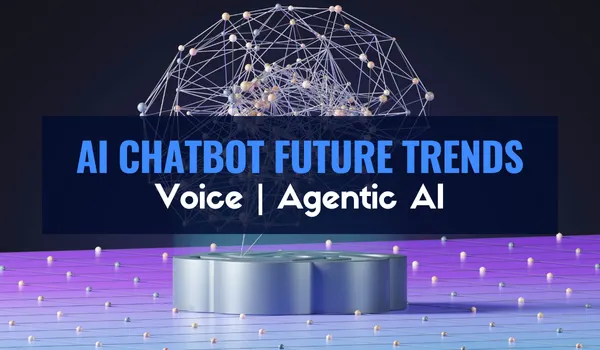TL;DR: 10 Best AI Voice Agents to Use in 2026
Looking for the best AI voice agents in 2026? This guide ranks the top AI voice agents for 24/7 availability, order management and tracking, field service scheduling, and enterprise voice AI needs.
We compare low-latency performance, CRM integration (Salesforce, HubSpot, Zendesk), analytics, and omnichannel coverage across chat, voice, email, and WhatsApp. You’ll find options from programmable APIs/SDKs to turnkey platforms, plus voice AI agent platforms like Robylon AI, ElevenLabs, Talkdesk, and Cognigy.
Our goal is simple: help you choose an AI voice agent that fits your stack, improves CSAT, reduces AHT, and shows real ROI fast. If you’re exploring AI-powered automation beyond voice, check out how AI agents transform customer experience.
Introduction
AI voice agents are built on a stack of advanced technologies that enable them to understand, process, and respond to human speech in real time. This blog covers a brief about the AI voice agents and highlights the top AI voice agents of 2026.
What are AI Voice Agents
An AI voice agent, also known as a voicebot, conversational voice AI, or virtual voice assistant is a smart software system designed to communicate with users through natural, spoken language. These agents leverage advanced AI to process speech, recognize user intent, and respond in a natural, real-time manner.
They are the brains behind modern virtual assistants, smart support tools, and voice-powered apps enabling businesses to automate conversations, reduce support loads, and deliver 24/7 service. AI voice agents are built on a stack of advanced technologies that enable them to understand, process, and respond to human speech in real time.
We have compiled these technologies in detail in our Guide to AI Voice Agents in 2026.
Core Technologies Powering Voice AI
- Automatic Speech Recognition (ASR): Transforms spoken language into written text.
- Natural Language Processing (NLP): Interprets the transcribed text to understand context, intent, and meaning.
- Natural Language Understanding (NLU): Interprets context and linguistic nuance for better accuracy.
- Dialogue Management: Decides the next best response using logic and conversation history.
- Text-to-Speech (TTS): Converts written responses into natural-sounding speech.
Together with technologies, it enables seamless, context-aware conversations across various platforms.
Top 10 AI Voice Agents of 2026
1. Robylon

It is an intelligent AI voice and chat agent platform tailored for modern customer support. Designed for seamless omnichannel communication, Robylon helps businesses automate voice calls, chats, and support tickets while integrating effortlessly with tools like CRMs and helpdesk software.
Key Features
- AI-powered voice and chat agents
- CRM, ticketing, and messaging platform integrations (e.g., HubSpot, Freshdesk, Slack, WhatsApp)
- Smart conversation routing and automation
- Natural language understanding (NLU) and speech recognition
- Analytics dashboard for performance tracking
Pricing
- Multiple pricing levels with enterprise-grade customization available
- Free trial available
Pros
- Easy setup with no-code/low-code tools
- Dedicated agents for voice and text automation
- Excellent for support, sales, and lead generation
- Scalable across industries
Cons
- Still expanding third-party integrations
- Currently more optimized for English and select global languages
Best For
Startups and mid-sized businesses looking for an affordable, powerful AI agent to manage voice and chat-based customer communication across platforms.
2. ElevenLabs
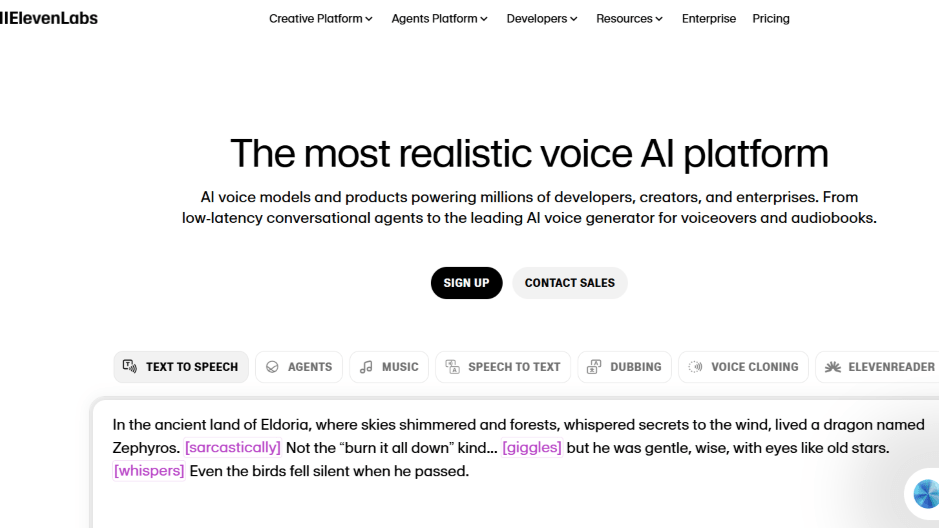
It is a cutting-edge AI voice synthesis platform renowned for its lifelike text-to-speech technology. It enables creators and businesses to generate highly natural and expressive voice content, perfect for audiobooks, podcasts, and gaming.
Key Features
- Ultra-realistic voice cloning and synthesis
- Multi-language and accent support
- Custom voice creation
- Emotional tone control
- Easy API integration
Pricing
- Free tier available
- Starter - $5 / month
- Creator - $11 / month
- Pro - $99 / month
Pros
- Industry-leading voice realism
- Flexible voice customization
- Fast and scalable cloud infrastructure
Cons
- Customizing advanced features may need some hands-on experience
- Focused mainly on voice generation, not conversational AI
Best For
Content creators, developers, and enterprises needing premium AI voice generation.
3. Bland AI
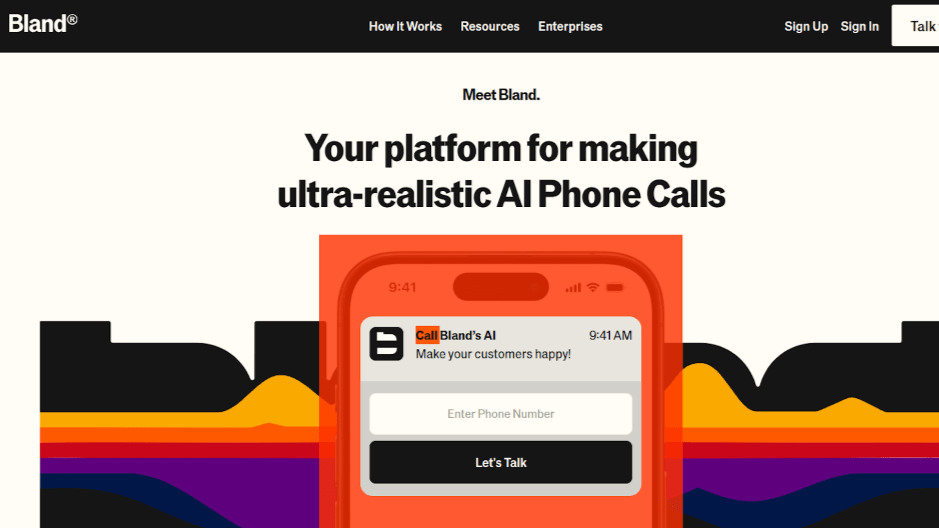
Bland AI is a developer-first platform for building AI voice agents that can make and receive phone calls at scale. It focuses on providing real-time conversational abilities with deep customization through APIs and integrations.
Key Features
- Real-time voice synthesis and transcription
- Developer-friendly API to control call flow
- Call routing, retries, and voicemail handling
- OpenAI and custom model support
- Webhook and CRM integration
Pricing
- Usage-based pricing; starting 100 free calls
- Build plan starting at $299 and scale plans at $499
- Enterprise Custom pricing available for large-scale deployments
Pros
- Scales up outbound and inbound calls reliably
- High degree of control through code
- Integrates with LLMs and external tools easily
Cons
- No UI or visual builder for non-technical users
- Requires backend setup and dev resources
Best For
Engineering teams and startups looking to launch programmable AI voice agents for lead gen, customer support, or workflow automation.
4. Vapi AI
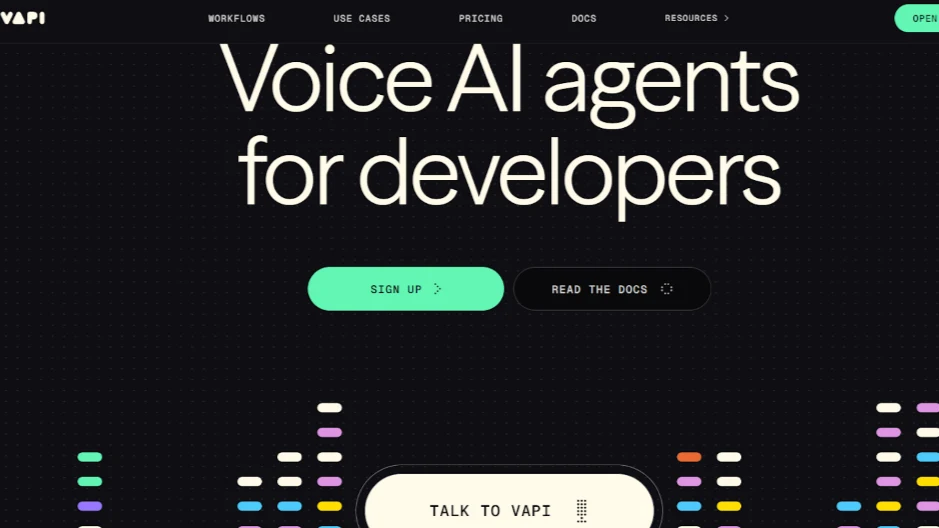
Vapi AI is an open-source voice agent SDK and platform designed to help teams quickly build AI voice bots that can talk naturally and execute logic-driven tasks during a call. It offers a flexible stack for real-time audio and agent orchestration.
Key Features
- Low-latency voice API built for developers
- Prebuilt integrations with LLMs like OpenAI and Claude
- WebSocket and webhook support
- Fully open-source with customizable logic
- Real-time audio streaming
Pricing
- Free tier available with usage limits
- Agency plan starts at $400 / month
- Startup plans at $800 / month
- Premium features and support available on request
Pros
- Open-source and self-hostable
- Fast to prototype and iterate
- Active community and developer support
Cons
- Lacks a ready-made UI for business users
- Needs technical expertise to deploy and scale
Best For
Developers and open-source enthusiasts building customizable AI voice systems for internal tools, customer service, or product integrations.
5. Tabbly.io
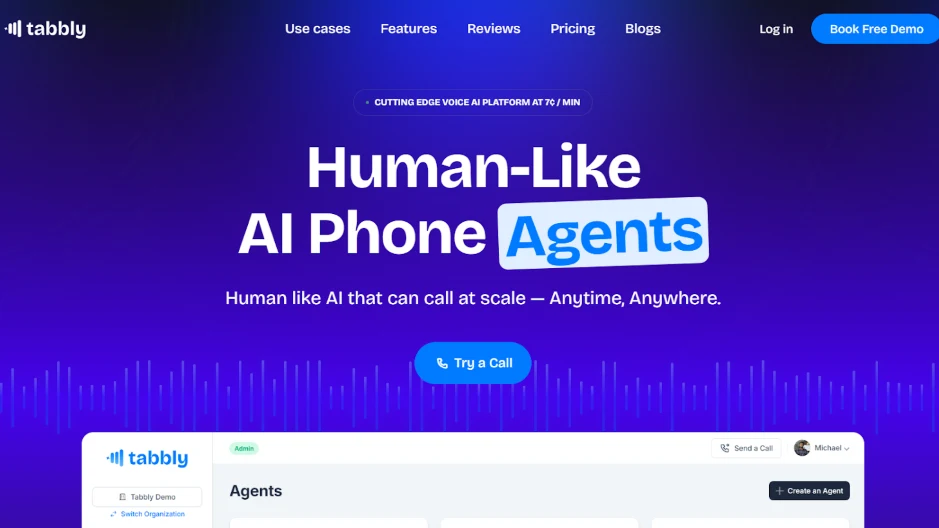
Tabbly.io provides an AI-driven voice automation solution tailored for customer support teams and sales professionals. Its voice agents help automate routine calls and improve outreach with natural conversations.
Key Features
- Automated outbound calling
- Voice-based lead qualification
- CRM integrations
- Real-time analytics and reporting
- Voicebot scripting tools
Pricing
- Pay per minute - $0.08 USD per minute, Humans cost $0.7 USD
- Enterprise Volumes - $0.06 USD per minute, for large committed volumes
Pros
- Simplifies high-volume calling workflows
- Easy-to-use voicebot builder
- Seamless integration with popular CRMs
Cons
- Best suited for outbound call-heavy businesses
- Limited multi-channel support
Best For
Sales and support teams focused on efficient voice outreach automation.
6. Cognigy
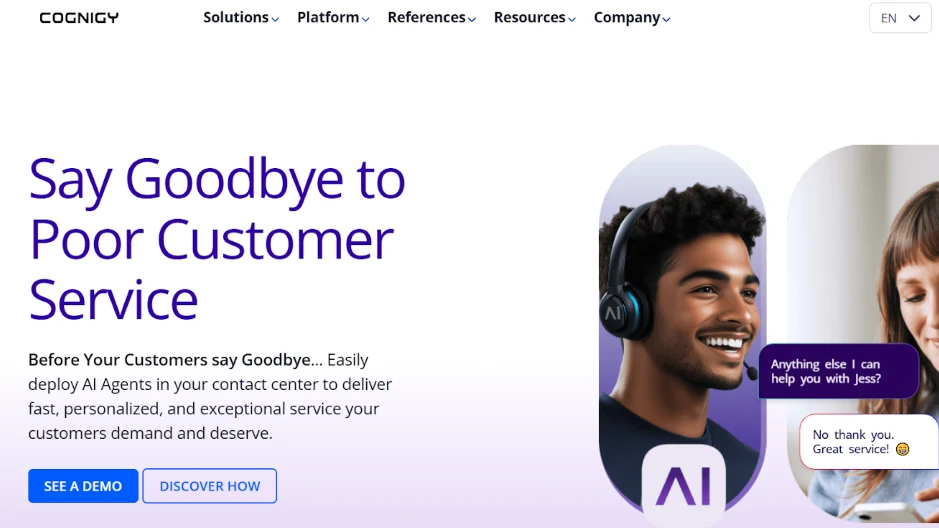
It is an enterprise-grade conversational AI platform specializing in intelligent voice and chatbots. It empowers businesses to build sophisticated AI voice agents that integrate deeply with backend systems.
Key Features
- No-code conversation builder
- Natural language understanding (NLU)
- Omnichannel deployment (voice, chat, messaging)
- Integrations with CRM, ERP, and telephony
- Advanced analytics dashboard
Pricing
- Enterprise pricing on request
Pros
- Highly customizable and scalable
- Strong integration capabilities
- Supports complex workflows and automation
Cons
- May be complex for small businesses
- Pricing is tailored to large organizations
Best For
Large enterprises needing customizable AI voice and chat solutions with deep backend integration.
7. Talkdesk
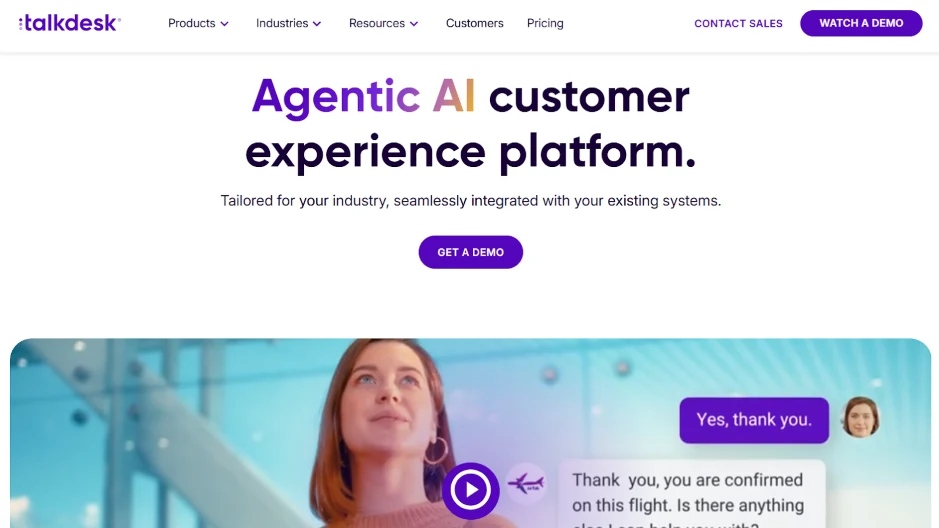
It is a leading enterprise cloud contact center solution that now leverages advanced AI voice agents to deliver smart, scalable customer experiences.
Key Features
- Talkdesk Virtual Agent: Automates voice conversations using conversational AI
- AI Trainer: Lets non-technical teams customize and train the AI with minimal effort
- Sentiment Analysis: Monitors customer emotion in real time for smarter routing
- Omnichannel Support: Effortlessly integrates voice, chat, email, and social media to ensure a unified customer experience
- Native CRM Integration: Compatible with Salesforce, Zendesk, and more
Pricing
- Quote-based (Custom plans tailored to business needs)
Pros
- Enterprise-grade AI with deep automation capabilities
- Intuitive tools for training and customizing virtual agents
- Strong security and compliance support (SOC 2, HIPAA-ready)
Cons
- Pricing can be on the higher end for mid-sized businesses
- Some features are best suited for large call centers and may be overkill for small teams
Best For
Large enterprises and BPOs looking to scale customer support operations with powerful AI voice automation across multiple channels.
8. PolyAI
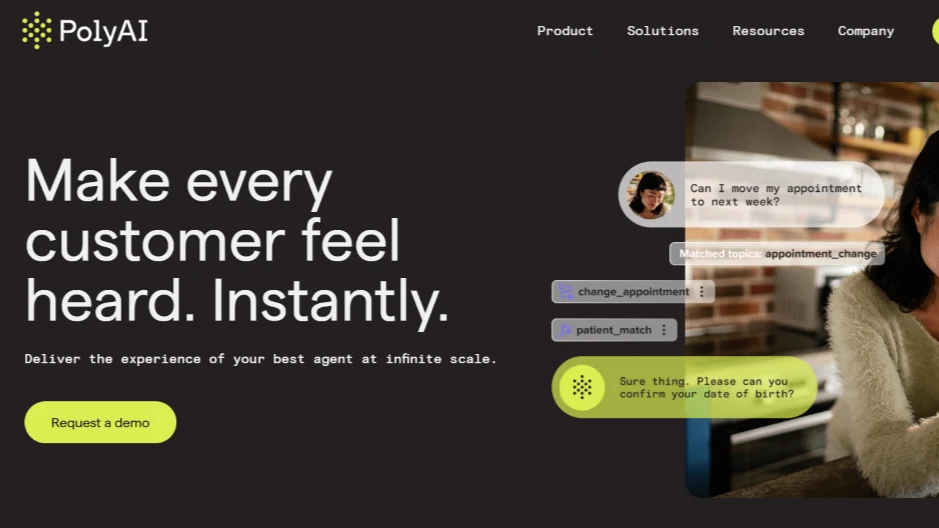
PolyAI offers sophisticated voice assistants focused on automating customer service calls with human-like interactions and quick issue resolution.
Key Features
- Conversational voice AI
- Multi-turn dialogue management
- Support for multiple languages
- Fast deployment with pre-built templates
- Integration with existing call centers
Pricing
- Pricing available on request
Pros
- Exceptional conversational flow
- Reduces customer wait times
- Supports complex queries
Cons
- Enterprise-focused pricing
- Setup may take time depending on use case complexity
Best For
Businesses aiming to improve customer service with advanced voice AI assistants.
9. Voiceflow
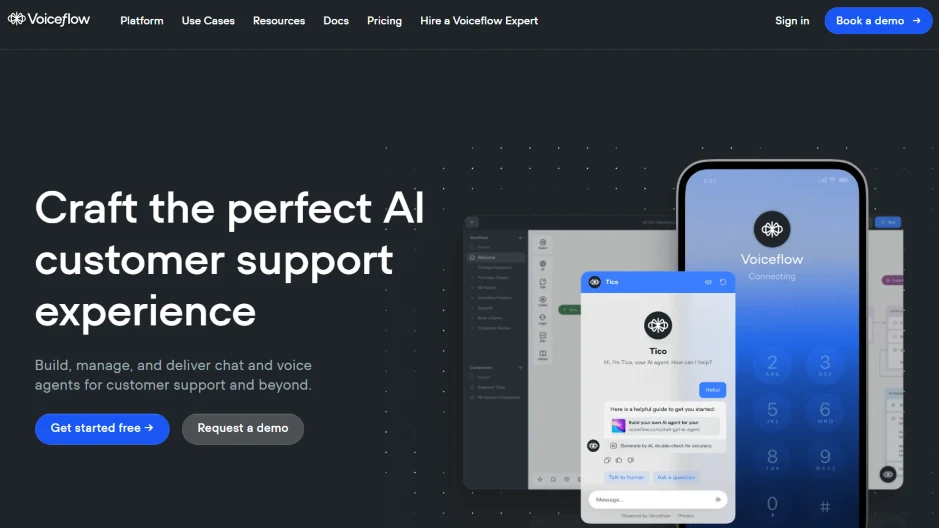
Voiceflow is a collaborative platform for designing, prototyping, and deploying voice and chat assistants. Originally focused on Alexa and Google Assistant, it has grown into a robust tool for building enterprise-grade conversational AI agents without code.
Key Features
- Drag-and-drop builder for conversation flows
- Multi-channel support (voice, chat, in-app)
- API and third-party integrations
- Collaboration tools for teams
- User testing and analytics tools built-in
Pricing
- Free plan available for individuals
- Pro - For individual builders- $60/month
- Business for growing teams - $150/month
- Enterprise for scaling volume - Custom pricing
Pros
- Intuitive interface for non-technical users
- Ideal for rapid prototyping and iteration
- Supports custom back-end logic and API calls
Cons
- May require technical support for complex deployments
- Primarily a design and prototyping tool requires external hosting for full deployment
Best For
Product teams, designers, and developers building and testing conversational interfaces before deployment.
10. Salesforce (Einstein AI Voice Assistant)
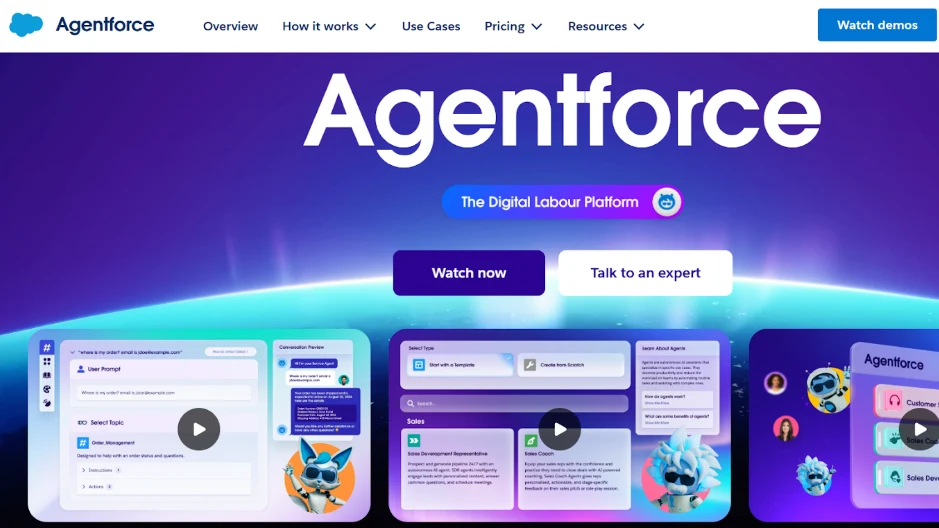
Salesforce Agentforce Assistant is an AI-powered voice and chat support solution integrated into Salesforce Service Cloud. It empowers customer service teams with generative AI capabilities to resolve queries, suggest responses, and streamline workflows in real-time.
Key Features
- Integrated voice and chat support
- Context-aware assistance and auto-summarization
- Connects natively with Salesforce data and workflows
- Real-time knowledge surfacing and action recommendations
Pricing
- Included with Salesforce Enterprise Cloud licenses
- Agentforce - $2 USD/Per conversation
- Custom pricing for enterprise-scale deployments
Pros
- Deep native integration with Salesforce CRM
- Automates common sales and service tasks via voice
- Boosts productivity and mobility for field teams
Cons
- Limited to the Salesforce ecosystem
- Not suitable as a standalone voice agent platform
Best For
Sales and support teams are already using Salesforce, looking to enhance productivity with embedded voice automation.
Real-World Applications of AI Voice Agents Across Industries
Explore Proven AI Chatbot Use Cases for Business in 2026 and decide the best fit for your business.
Why It Matters for Your Business
- Always Available: Operates 24/7 to support customers globally.
- Built for Scale: Handles thousands of concurrent interactions while maintaining high performance and response quality.
- Cost Efficient: Automates high-volume tasks, reducing reliance on human agents.
- Improves Customer Experience: Offers faster, more personalized interactions with minimal friction.
- Insight-Driven: Captures data from every interaction to drive product and CX improvements.
See how AI-powered customer service drives conversions in our guide: Customer Service Reimagined.
Conclusion - Choosing the Right AI Voice Agent in 2026
AI voice agents in 2026 have come a long way from sounding like real humans to handling entire conversations on their own. They are now powerful tools that businesses can rely on. Whether you are seeking multilingual support, sales call automation, or seamless IVR integration, today’s top solutions offer a broad spectrum of features tailored to varied needs and industries.
With a growing number of enterprise-ready voice AI platforms like Robylon, Cognigy, Talkdesk, and Salesforce - Agentforce; choosing the right one often hinges on key factors such as scalability, ease of integration, and how well it aligns with your existing tech ecosystem. The best voice agent is not just the most advanced, it is the one that fits your use case like a glove.
See how our AI platform integrates with voice for omnichannel support.
Why Robylon Deserves the Mic?
Amid a crowded market, Robylon Voice Agents stands out for its precision, adaptability, and exceptional user-friendliness. Designed for chat, ticket and voice automation, Robylon is built to support real-world customer interactions with a layer of intelligence that feels truly conversational.
Here is what makes Robylon AI stand out
- Voice + Chat Unified Agents for seamless omnichannel support
- Instant Integrations with CRMs, helpdesks, and messaging apps
- Fast Setup with a no-code/low-code builder launch in days, not weeks
- Dynamic Analytics to track performance and optimize conversations
- 24/7 Availability so you never miss a customer query
Robylon is not just another Voice AI Agent, it is your brand’s voice, automated and amplified.
Ready to Turn Up the Volume on Your Customer Experience?
Start your free trial or book a demo and let your brand do the talking.
FAQs
Which AI voice agent suits enterprise contact centers?
For enterprises that need telephony routing, compliance, and large-scale support automation, Robylon AI and Cognigy are top choices. Robylon AI stands out for combining voice, chat, and ticket automation in a single stack, ideal for teams that want 80%+ automation and direct CRM syncing without juggling multiple vendors.
Retell/ Vapi/Robylon, which should I choose for phone-based automation?
If you need ready-to-deploy production agents with monitoring, analytics, and compliance built in, Retell is a good fit. If your team wants developer-first infra and faster prototyping, Vapi works well. For teams that want out-of-the-box deployment plus multi-channel orchestration, Robylon AI provides a balanced approach: voice + chat + ticketing in one.
Which are the top AI voice agents in 2026?
Some of the best options include:
- Robylon AI: no-code, enterprise-ready voice and chat automation with omnichannel context
- Retell AI: production-ready monitoring and analytics for voice agents
- PolyAI: enterprise-grade customer service voice assistants
- Vapi: developer-centric APIs for building custom voice agents
- OpenAI Realtime: low-latency speech-to-speech models
- Deepgram Aura: ASR + TTS optimized for real-time use
Cognigy Voice Gateway: enterprise telephony orchestration
Transcription quality: What ASR accuracy should we expect in noisy environments?
Voice agents use Deepgram-powered ASR tuned for multi-accent, multilingual environments. In clear conditions, accuracy can exceed 90–95%, and adaptive noise filtering keeps performance strong even with background chatter, critical for customer support lines and field calls.
What can voicebot actually do on a call?
Voicebots can handle far more than routing calls. Businesses automate FAQs, order tracking, payment reminders, customer authentication, and rescheduling; all while maintaining context across channels. Importantly, voice agents like Robylon ensure clean human handover when an issue requires a live agent, so no details get lost.
How do AI voice agents work?
AI voice agents listen, interpret, and respond in real time. They transcribe speech into text (ASR), process intent using NLP/LLMs, fetch relevant information from your CRM or knowledge base, and generate a natural reply with TTS.
How do I choose the best AI voice platform?
Compare tools based on features like latency, speech accuracy, CRM integrations, support language options, and scalability for your team size.
What industries benefit most from AI voice agents?
Industries like e-commerce, healthcare, fintech, and telecom benefit most due to high call volumes and the need for instant, multilingual support.
Can AI voice agents replace human support agents?
They can automate repetitive tasks and first-level queries, reducing workload but are best used alongside human agents for complex issues.
How do AI voice agents differ from chatbots?
Voice agents focus on spoken interactions using ASR (automatic speech recognition), while chatbots handle text. Some platforms offer both, like Robylon AI.
What is an AI voice agent?
An AI voice agent is a software program that uses artificial intelligence to interact with users through voice, typically used in customer support, sales, and virtual assistants.





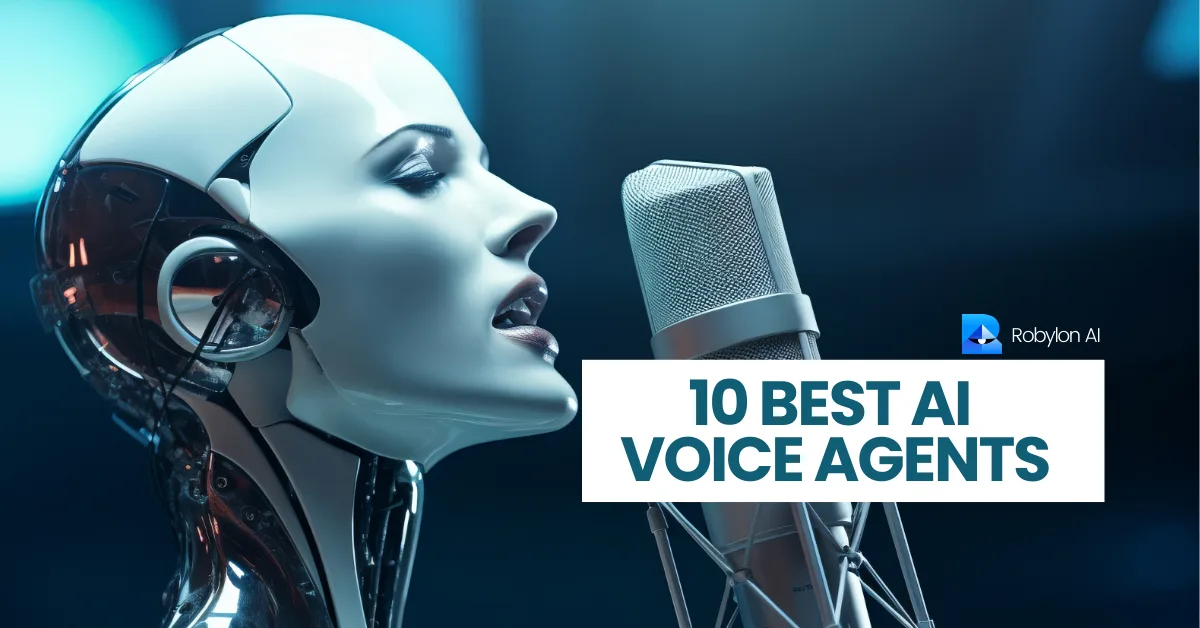


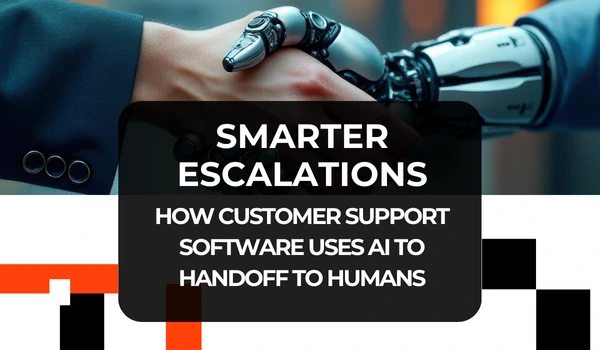
.png)
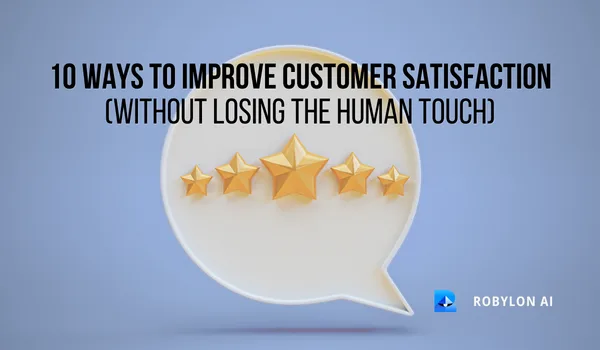
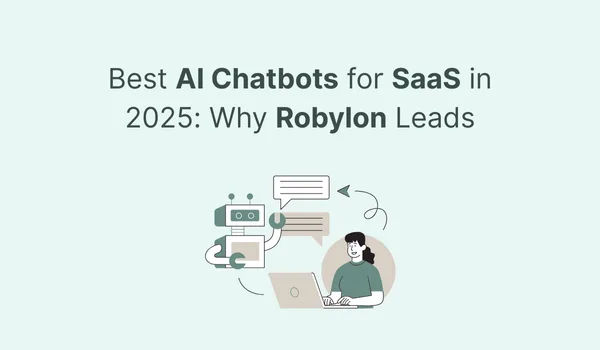
.png)
